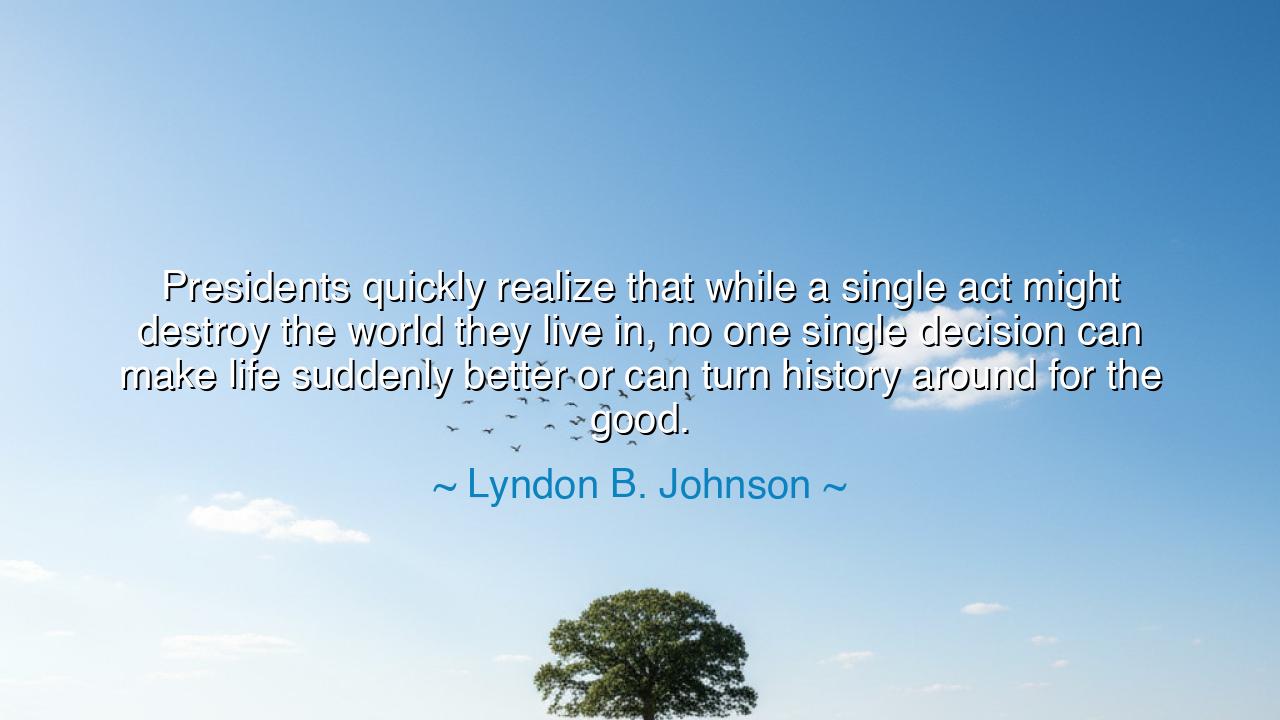
Presidents quickly realize that while a single act might destroy
Presidents quickly realize that while a single act might destroy the world they live in, no one single decision can make life suddenly better or can turn history around for the good.






Listen, children of the ages, and heed the words of Lyndon B. Johnson, who spoke with the solemn weight of one who has gazed upon the fragile fulcrum of history: “Presidents quickly realize that while a single act might destroy the world they live in, no one single decision can make life suddenly better or can turn history around for the good.” Know that in the corridors of power, as in the quiet chambers of the heart, decisions are not mere gestures; they are tremors that ripple through the fabric of existence. One act may shatter all around it, yet no solitary choice carries the alchemy to instantly transform destiny. Such is the dual nature of human action—both terrifying in its potential to harm and humble in its limitations to heal.
Consider the tale of Cuban Missile Crisis, when President John F. Kennedy and his advisors confronted the shadow of nuclear war. In a matter of days, the world teetered on the knife’s edge. One wrong move—one impulsive strike—could have obliterated cities, nations, and dreams. And yet, no single speech, no solitary command, could instantly dissolve the fears of humanity or rewrite the arc of history toward peace. It was patience, deliberation, and the steady weaving of many actions, small yet deliberate, that guided the world back from the brink. From this, we learn that even the weightiest of positions demands both caution and humility.
The wisdom of Johnson’s words reminds us that leadership is a mosaic of responsibility. Power is not a magic wand, nor is it a sword that can cut cleanly through injustice and suffering in a single stroke. A president—or any soul entrusted with authority—must understand the fragility of the world they inhabit, that their missteps can bring ruin, yet their virtues alone cannot conjure instantaneous salvation. History moves like a river, slow and inexorable; to grasp it in one hand is folly. One must act with insight, with patience, and with an awareness that change is often the sum of countless, sometimes unseen, efforts.
In the annals of time, King Solomon serves as an eternal mirror. Though granted wisdom beyond mortal measure, he understood that no single decree could deliver his people from all suffering or perfect the kingdom overnight. Even the wisest among men must reckon with the complexity of life, the web of choices, and the inexorable weight of cause and effect. Johnson’s insight echoes this ancient truth: leadership is not a theatre of instant victories, but a sacred labor of guidance, stewardship, and endurance.
Let us also remember the Great Society programs that Johnson championed—Medicare, civil rights legislation, poverty alleviation. These were not the fruit of a single act; they were the result of persistent, multi-faceted effort over years. Each law, each policy, each negotiation contributed a thread to the larger tapestry of progress. History was not rewritten in a day, yet the consistent accumulation of decisions—each mindful, each deliberate—moved society closer to justice and compassion. Here lies the tangible proof of Johnson’s reflection: meaningful change is patient and collective, never instantaneous.
From this teaching, we glean a lesson of humility and diligence. No decision should be made in haste, for even small errors may carry ruin. Yet, do not despair that your individual actions cannot reshape the world; the transformation comes through the accumulation of careful, principled choices, pursued with clarity and courage. The ancients knew it: the mightiest rivers carve valleys not by single torrents, but by persistent flow.
Practical action, therefore, is rooted in both caution and persistence. Consider your decisions, measure their possible consequences, and act with integrity, knowing that while you cannot snap your fingers to heal all wrongs, each step toward justice, each effort toward understanding, compounds over time. Engage with patience, for true leadership—whether of nations, communities, or one’s own life—is a symphony of consistent, wise, and deliberate acts.
Hear this, children of the ages: embrace the weight of responsibility without the arrogance of omnipotence. Let your actions reflect foresight and compassion, and recognize that while destruction may come swiftly, the building of a better world requires steadfast hands, enduring effort, and the quiet courage to shape history one measured choice at a time.






AAdministratorAdministrator
Welcome, honored guests. Please leave a comment, we will respond soon